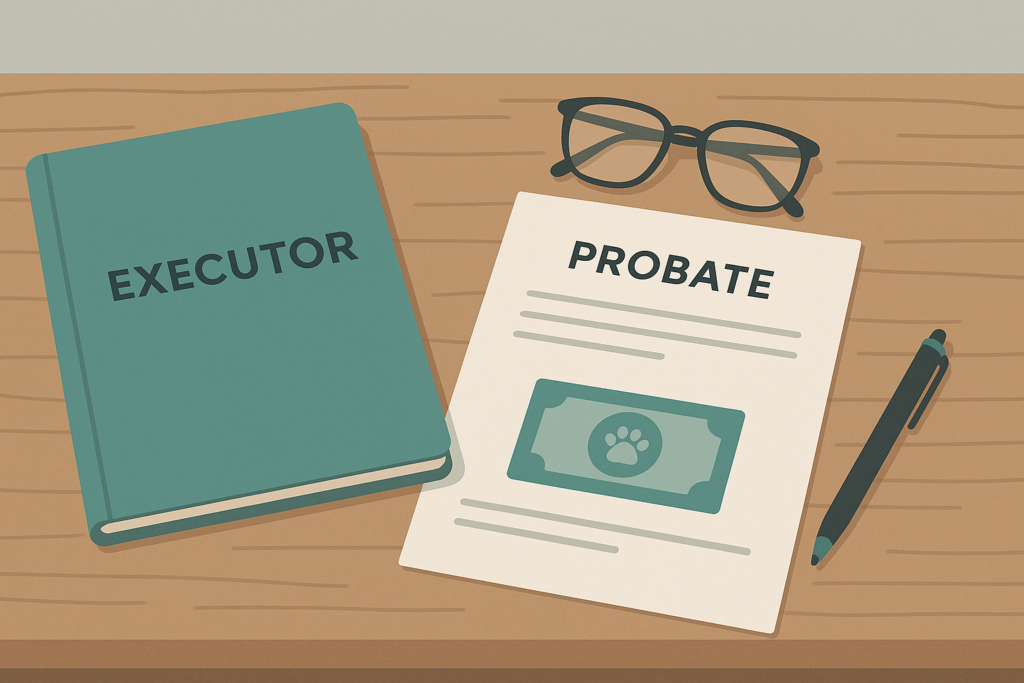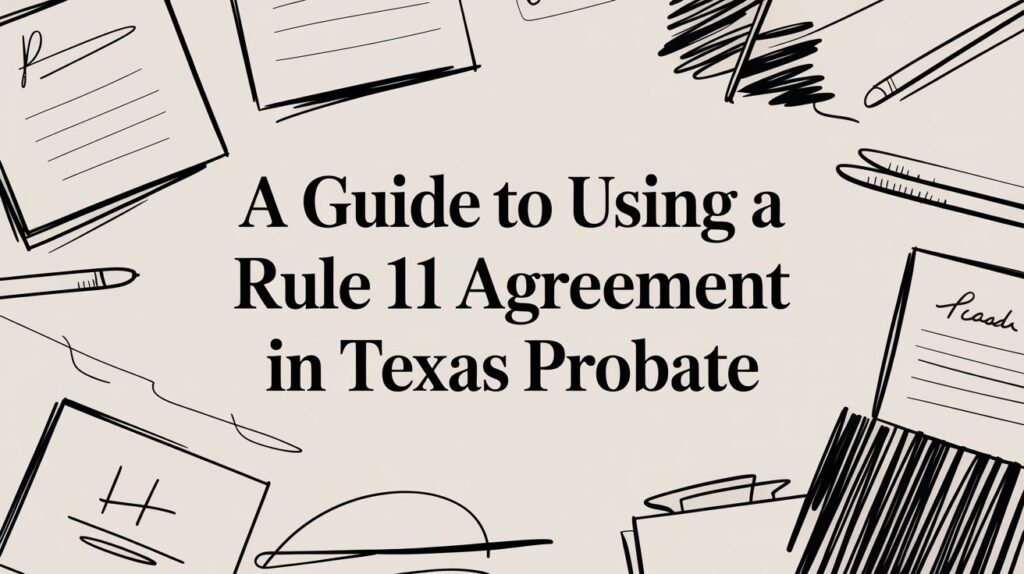In Texas, when a person passes away, their will determines how their estate is settled. If they die without a will, state law governs the settlement. One of the primary duties of an executor or administrator (collectively referred to as a personal representative) is to pay off any debts the deceased owed. In many cases, the estate may not have sufficient liquid assets to cover these debts, leading to the necessity of selling real estate. This article offers a comprehensive look into the legal process of selling real estate to settle estate debts in Texas, breaking down each step, exploring probate laws, and providing practical tips for executors and administrators to follow.
Understanding Probate in Texas
In Texas, probate administers a deceased person’s estate by validating the will, paying debts, and distributing the remaining assets to the beneficiaries. There are two types of probate in Texas:
- Independent Administration – Allows the personal representative to administer the estate with minimal court involvement.
- Dependent Administration – Requires more oversight by the court and approval for major decisions, such as selling property.
Both types of probate may require the sale of real estate to pay estate debts. However, the legal process differs slightly between them.
Step-by-Step Guide: Selling Real Estate to Pay Debts in Texas Probate

1. Identifying Debts and Evaluating the Estate
Before selling any real estate, the personal representative must evaluate the entire estate to determine whether selling property is necessary. The first step is to create an inventory of all assets and liabilities. This list includes real estate, bank accounts, stocks, vehicles, and other valuable possessions, along with outstanding debts, such as:
- Mortgages
- Medical bills
- Credit card debt
- Personal loans
- Funeral expenses
- Taxes
The representative will also need to assess the liquid assets available in the estate. If the estate lacks enough liquid assets (cash, stocks, etc.) to cover the debts, the executor may need to sell real estate.
2. Court Approval for Selling Real Estate (Dependent Administration)
If the estate is under dependent administration, the personal representative must seek the court’s approval before selling any property. To do this, the representative must file a Petition for Sale of Real Property with the probate court. This document will outline:
- The debts of the estate
- The real property to be sold
- The reasons for selling the property (typically to pay off debts)
Once the petition is filed, the court will schedule a hearing to review the request. During this hearing, the personal representative must prove that selling the property is necessary to settle debts. If the court agrees, it will issue an Order of Sale, which authorizes the sale of the property.
In independent administration, the representative does not need to seek court approval to sell real estate unless the will explicitly requires it.

3. Appraising the Property
After receiving court approval (if necessary), the next step is to determine the property’s market value. This is crucial to ensure the sale is fair and in the best interest of the estate and its beneficiaries. A real estate appraiser typically assesses the property and provides a formal valuation.
The appraiser’s report helps set a reasonable asking price for the property, ensuring the estate receives fair market value to cover debts and maximize any remaining distribution to beneficiaries.
4. Listing the Property for Sale
Once the property has been appraised, it’s time to put it on the market. The personal representative can hire a licensed real estate agent to assist with the sale, which often expedites the process and ensures a broader pool of potential buyers. The representative should provide the agent with the necessary documentation to prove they have the authority to sell the property, including the court’s Order of Sale (if applicable).
At this stage, the property is marketed like any other real estate listing, with the goal of attracting qualified buyers. Depending on the property’s location and condition, it may sell quickly, or it may take time to find the right buyer.
5. Accepting an Offer and Closing the Sale
When an offer is made, the personal representative must ensure it aligns with the appraised value and the best interest of the estate. In dependent administration, the representative may need to seek court approval to accept the offer before proceeding with the sale. In independent administration, the representative has more discretion and can accept an offer without court oversight.
Once an offer is accepted, the next step is to proceed with the closing process. This involves transferring ownership of the property to the buyer and ensuring all legal documents are in order. During closing, the proceeds from the sale will be deposited into the estate’s account.
6. Paying Debts with Sale Proceeds
With the proceeds from the sale in hand, the personal representative must prioritize paying the estate’s debts. In Texas, debts must be paid in a specific order of priority:
- Funeral expenses
- Family allowances (spouse and children)
- Secured debts (such as a mortgage)
- Taxes owed to the state or federal government
- Unsecured debts (credit card debt, medical bills, etc.)
The representative must ensure that all debts are paid off in the proper order before distributing any remaining proceeds to the beneficiaries.
7. Filing a Report of Sale (Dependent Administration)
In dependent administration, the personal representative completes the sale and files a Report of Sale with the probate court. The report provides the sale price, the buyer’s details, and outlines how the representative will use the proceeds to pay the estate’s debt. The court will review the report and, if everything is in order, approve the sale.
Once the court approves the Report of Sale, the personal representative can proceed with using the funds to settle debts and complete the probate process.
Potential Challenges and Solutions in Selling Real Estate to Pay Estate Debts
While selling real estate may seem straightforward, various challenges can arise during the process. Understanding these challenges and knowing how to navigate them can help ensure a smoother experience.
Title Issues

Before the sale can be completed, the personal representative must ensure the title to the property is clear. This means there are no outstanding liens or claims against the property that could complicate the sale. If title issues arise, such as unresolved mortgages or tax liens, the representative must address them before closing the sale. This may involve negotiating with creditors or paying off liens from the sale proceeds.
Disputes Among Beneficiaries
In some cases, beneficiaries may disagree with the decision to sell real estate, particularly if they have sentimental attachments to the property. To resolve such disputes, the personal representative must demonstrate that selling the property is necessary to pay off the estate’s debts. Communication is key in these situations, and it may be helpful to involve a probate attorney or mediator to facilitate discussions among beneficiaries.
Selling the Property Below Market Value
If the real estate market is slow or the property is in poor condition, the personal representative may struggle to sell the property at its appraised value. The representative should aim for a fair sale price, but may need to accept a lower offer to ensure debts are paid and the probate process moves forward. In such cases, the court may need to approve the sale at a reduced price, particularly in dependent administration.
Hiring Professional Help
The legal process for selling real estate to settle estate debts in Texas can be complex and overwhelming, particularly for personal representatives who are unfamiliar with probate law. For this reason, it’s often advisable to hire professionals to assist with various aspects of the sale, including:
- Probate Attorneys – An experienced Texas probate attorney guides the personal representative through the court process. They ensure all legal requirements are met and resolve disputes that arise.
- Real Estate Agents – A licensed agent can help market the property, attract buyers, and negotiate the best possible sale price.
- Appraisers and Inspectors – These professionals provide accurate valuations and assessments of the property. This helps ensure the sale is conducted fairly and transparently.
Conclusion: Navigating the Sale of Real Estate in Texas Probate
Selling real estate to settle estate debts in Texas involves a careful process that balances legal, financial, and practical considerations. Personal representatives follow the proper steps, obtain court approval, and distribute sale proceeds to ensure they pay the estate’s debts and complete the probate process efficiently.
By understanding the legal requirements, anticipating potential challenges, and seeking professional guidance when necessary, personal representatives can navigate the sale of real estate in Texas probate with confidence and success. Whether the estate involves independent or dependent administration, the key is to remain diligent, transparent and committed to upholding the best interests of both creditors and beneficiaries.








